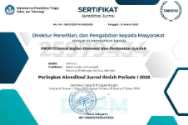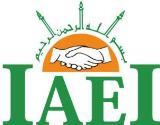Andriyani, S. S., Budidharmanto, L. P., & Junianto, Y. (2022). Effects of Financial Literacy and Financial Management Teaching on Financial Behavior (Student Study of Hotel & Tourism Business Study Program). Primanomics : Jurnal Ekonomi & Bisnis, 20(2), 139–148. https://doi.org/10.31253/pe.v20i2.1180
Anggraini, Puspa, S., & Cholid, I. (2022). 2322-Article Text-6497-1-10-20220403. Publikasi Riset Mahasiswa Manajemen Pengaruh, 3(2), 178–187.
Fadhilah, N. (2023). Pengaruh Penggunaan Aplikasi Belanja Online, Gaya Hidup dan Literasi Keuangan terhadap Consumer Behavior Mahasiswa. Journal of Business & Applied Management, 16(2), 141. https://doi.org/10.30813/jbam.v16i2.4293
Hidayah, F. N., Nugroho, B. S., Ardiati, A. R., Tsaqyfa, M. N., Hakim, M. A., & Ridlwan, A. A. (2023). Meneropong Maraknya Pinjaman Online di Kalangan Mahasiswa: Motif dan Dampak Terhadap Consumer Behavior. Jurnal Ilmu Manajemen, 11(4), 821–832.
Idris, D. L. (2022). Analisis Faktor-Faktor Yang Mempengaruhi Consumer Behavior Mahasiswi Jurusan Ekonomi Syariah Uin Mataram Pada Trend Fashion (Pakaian). Jurnal Impresi Indonesia, 1(6), 638–647. https://doi.org/10.36418/jii.v1i6.114
Lin, W. R., Wang, Y. H., & Hung, Y. M. (2020). Analyzing the factors influencing adoption intention of internet banking: Applying DEMATEL-ANP-SEM approach. PLoS ONE, 15(2), 1–25. https://doi.org/10.1371/journal.pone.0227852
Long, T. Q., Morgan, P. J., & Yoshino, N. (2023). Financial literacy, behavioral traits, and ePayment adoption and usage in Japan. Financial Innovation, 9(1). https://doi.org/10.1186/s40854-023-00504-3
Luas, G. N., Irawan, S., & Windrawanto, Y. (2023). Pengaruh Konsep Diri Terhadap Consumer Behavior Mahasiswa. Scholaria: Jurnal Pendidikan Dan Kebudayaan, 13(1), 1–7. https://doi.org/10.24246/j.js.2023.v13.i1.p1-7
Manurung, W. S. R., Rahmani, N. A. B., & Aslami, N. (2022). Pengaruh Consumer Behavior, Pemberian Reward, Redibilitas Platform Terhadap Keputusan Penggunaan E-Wallet Pada Transaksi E-Commerce Dengan Kemudahan Penggunaan Sebagai Variabel Moderating (Studi Kasus Mahasiswa FEBI UIN Sumatera Utara). Jurnal Manajemen Akuntansi (JUMSI), 2(4), 964–984.
Nasution, U. I., K, K., & Rahmani, N. A. B. (2023). The Influence of Financial Inclusion and Financial Literacy on Financial Performance (Case Study of Bank Sumut Syariah Panyabungan). EKOMBIS REVIEW: Jurnal Ilmiah Ekonomi Dan Bisnis, 12(1), 1–10. https://doi.org/10.37676/ekombis.v12i1.4845
Prawira, S. A., & Pranitasari, D. (2020). Pengaruh Accessibility, Inovasi dan Kualitas Pelayanan Fasilitas Publik Terhadap Kepuasan Penumpang Disabilitas di Kereta Rel Listrik Jakarta. Jurnal Sekolah Tinggi Ilmu Ekonomi Indonesia, 1–15. Retrieved from http://repository.stei.ac.id/id/eprint/1195
Salma, S., Agustine, A. P. P., & Nurika, H. (2023). Analisis Persepsi Kemudahan dan Persepsi Manfaat Terhadap Minat Menggunakan OVO pada Mahasiswa Fakultas Ekonomi Universitas Sarjanawiyata Tamansiswa Yogyakarta. Al-Kharaj : Jurnal Ekonomi, Keuangan & Bisnis Syariah, 5(6), 2987–2998. https://doi.org/10.47467/alkharaj.v5i6.2664
Salwa, N., Rahma, T. I. F., & Nasution, J. (2022). Pengaruh Literasi Keuangan dan Financial Technology terhadap Inklusi Keuangan Mahasiswa UINSU (Studi Kasus Mahasiswa FEBI Stambuk 2017). Jurnal Manajemen Akuntansi (JUMSI), 2(2), 353–364.
Saraswati, A. M., & Nugroho, A. W. (2021). Financial Planning dan Pengelolaan Keuangan Generasi Z di Masa Pandemi Covid 19 melalui Penguatan Literasi Keuangan. Warta LPM, 24(2), 309–318. https://doi.org/10.23917/warta.v24i2.13481
Sari, M. P., & Irdhayanti, E. (2022). Pengaruh Pengetahuan Financial Planning Dan Sikap Keuangan Terhadap Financial Planning Pada Mahasiswa. Jurnal Economina, 1(3), 439–451. https://doi.org/10.55681/economina.v1i3.100
Sukmawan, N., Putri, A. D., Setyaningrum, D., Juliano, M. W., & Hilal, R. S. (2024). Pengaruh Peminjaman Online terhadap Dinamika Kehidupan Mahasiswa di Universitas Pendidikan Indonesia. Al-Istimrar: Jurnal Ekonomi Syariah, 3(1), 22–32.
Sumarno, Gimin, Noviana, E., Dafik, Ridlo, Z. R., & Mursyidah, I. L. (2024). The analysis of the RBL-STEM application in improving student financial literacy in controlling consumptive behavior. Heliyon, 10(12), e32382. https://doi.org/10.1016/j.heliyon.2024.e32382
Syauqi, A., Lubis, F. A., & Atika. (2022). Pengaruh Cashback, Flash Sale, Tagline “Gratis Ongkir” Terhadap Impulse Buying Konsumen Generasi Z Pada Shopee (Studi Kasus Mahasiswa Universitas Islam Negeri Sumatera Utara). Jurnal Manajemen Akuntasi (JUMSI), 2(2), 309–324.
Tsani Syafiq Nuruddin, S., & Himmati, R. (2023). Pengaruh Fitur Paylater, Spinjam dan Affiliate terhadap Minat Konsumen dalam Berbelanja pada Aplikasi Shopee : Studi Kasus Pengguna Shopee pada Mahasiswa FEBI UIN SATU Tulungagung. Al-Kharaj: Jurnal Ekonomi, Keuangan & Bisnis Syariah, 5(6), 173–191. https://doi.org/10.47467/alkharaj.v5i6.160
Zahra, D. R., & Anoraga, P. (2021). The Influence of Lifestyle, Financial Literacy, and Social Demographics on Consumptive Behavior. Journal of Asian Finance, Economics and Business, 8(2), 1033–1041. https://doi.org/10.13106/jafeb.2021.vol8.no2.1033
Zahroh, A., Septiana, A., & Arief, R. Z. (2023). Pengaruh Kepercayaan, Kemudahan, dan Manfaat terhadap Keputusan Pembelian Menggunakan Metode Pinjaman Online Spaylater pada Mahasiswa di Kabupaten Bangkalan. Jurnal Pendidikan Ekonomi Undiksha, 15(1), 55–62. https://doi.org/10.23887/jjpe.v15i1.63061
Zhao, H., Peng, H., & Li, W. (2022). Analysis of Factors Affecting Individuals’ Online Consumer Credit Behavior: Evidence From China. Frontiers in Psychology, 13(July). https://doi.org/10.3389/fpsyg.2022.922571
 (Universitas Islam Negeri Sumatera Utara)
(Universitas Islam Negeri Sumatera Utara) 




.jpg)



